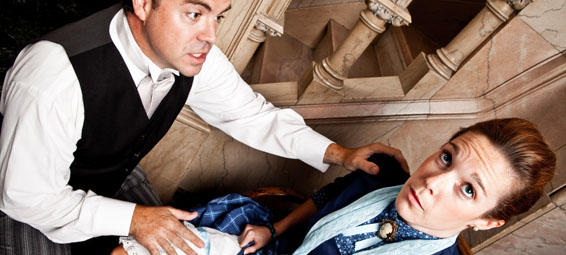In the Next Room, or the vibrator play is a play about vibrators in the same way that Aaron Sorkin’s Sports Night is a TV show about sports. The contraption in question, newfangled for the late 1880s and looking here like a cross between a hair dryer and, as one character points out, a farm tool, is less a catalyst for individual sexual awakening than it is for discoveries of the emotional variety— the kind that must ultimately be shared.
Dr. Givings (Max Hartman) and his wife Catherine (Martha Harms) are among the first of their neighbors to adopt electricity, thanks to Dr. Givings’ fanboy enthusiasm for Thomas Edison and his need for the technology in his home office, a space off the living room he calls his “operating theater.” This is where he treats his patients, the latest of which is a young housewife named Sabrina Daldry (Catherine DuBord), who suffers from the commonly diagnosed ailment of hysteria. The remedy is at least one pelvic massage a day, otherwise known as a screaming orgasm. Mrs. Daldry, whose affliction really has more to do with her humdrum older husband, Mr. Daldry, is skeptical at first. However, her misgivings quickly give way to an unmentionable, unexplainable thrill, especially when the power goes out and Mrs. Daldry’s therapy is administered “manually” by Annie (Kristin McCollum), Dr. Givings’ capable yet supposedly sexless assistant.
As a man of science, Dr. Givings is excited only by what electricity can do for his patients. But that’s not comfort enough for Catherine, who lives on the fringes of her husband’s life and yearns for sympathetic company. She’s forever banished to the living room (where she listens curiously to what goes on in his operating theater) or the upstairs unseen nursery, a cruel name for a space where she cannot actually nurse their infant daughter. Catherine’s milk is inadequate, and so a wet nurse, Elizabeth (JaQuai Wade), must be hired.
Playwright Sarah Ruhl’s clever staging affords us a fly-on-the-wall feeling, and Clare Floyd DeVries’ design is lovely and warm, all red brick and gold details (an effect aided by the good work of lighting designer Lisa Miller and props designers Jen Gilson-Gilliam and Judy Niven). The living room and Dr. Givings’ operating theater are all one set, open to the audience, though of course the characters act as if there is a wall between the two rooms. There are no scene changes, so the steady uphill momentum goes unbroken though I wished occasionally for more ebb and flow.
We barrel along so well that the play’s weightier issues, like Catherine’s supposed inadequacy as a mother, aren’t allowed to sneak up and sucker punch us the way they should. Characters come and go so quickly we’re hardly allowed to see the pain register, so focused we are still on the last joke. While I appreciate director Jonathan Taylor’s brisk pace and the actors’ comedic chops (both Catherine and Leo Irving, Dr. Givings’ lone male patient who lends a breath of fresh air to the second act, deliver excellently quick, nervous monologues), the handling of the more delicate threads feels ham-fisted. The rush is especially felt during an otherwise touching scene between Annie and Sabrina Daldry near the end of the show.
Still, this is a fine production of a fine play, and there is little to quibble over that hasn’t already been quibbled to death. While Ruhl is too good to rely entirely on the funny factor of buttoned-up Victorian ladies orgasming loudly, those particular bits get a bit tiresome after awhile. What was outright laughter gives way to uncomfortable titters. But Max Hartman, last seen by me in the Kitchen Dog’s regrettable production of Ponzi, makes it clear that all he needs is the right role. His Dr. Givings stands out amongst the ensemble cast, and Hartman delivers a nuanced portrait of a man who has enough pathos for a woman—his wife, no less, an entirely unfashionable thing—to reevaluate his own position in the world in order to meet her needs. Love is largely giving and giving up, and so the doctor is more than appropriately named.






